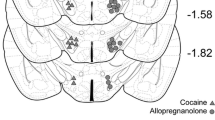Abstract
Rationale: The endogenous cannabinoid system is thought to play a role in reinforcement processes. Objectives: We tested the effects of five doses of the cannabinoid receptor 1 (CB1) antagonist SR141716 [0, 0.3, 1, 3 and 10 mg/kg intraperitoneal (IP)] on intracranial self-stimulation at the level of the median forebrain bundle (MFB). Self-stimulation was assessed 30 min and 210 min after SR141716 administration. We compared the effect of SR141716 with the effect of a decrease in the magnitude of stimulation (–100 µA) and the effects of a cocaine injection (1, 5 and 10 mg/kg IP). Methods: a protocol of rate-frequency curve for self-stimulation was applied. Two rate-frequency curves were established daily, 3 h apart. The frequency required to produce half-maximal performance (M50) and the maximal performance (RMax) were used as the parameters to characterize the rate-frequency functions. Results: SR141716 decreased the sensitivity to the electrical brain stimulation. SR141716 induced a shift to the right of the rate-frequency curve. This effect depended on the dose administered and the time after injection. Thirty minutes after the injection, 1, 3 and 10 mg/kg SR141716 induced a significant decrease in sensitivity to electrical stimulation, as shown by an elevation in the M50 value. RMax showed a tendency to decrease with increasing doses. At 210 min after administration, 3 and 10 mg/kg SR141716 maintained their decreasing effect on the sensitivity to the stimulation as shown by the significant increase of the M50, however, the maximal response was restored to the basal value. A decrease in self-stimulation intensity produced an effect comparable to the one observed 30 min after either 3 or 10 mg/kg SR141716, while cocaine (5 and 10 mg/kg) produced the opposite effect. Neither condition affected the rate-frequency curve measured 3 h later. Conclusions: In accordance with recent observations, these experiments suggest that the endogenous cannabinoid system facilitates the perception or the effects of positive reinforcers. They also suggest that this neurochemical system could be a target of interest for treating psychopathologies implicating the reinforcing system.
Similar content being viewed by others

Author information
Authors and Affiliations
Additional information
Electronic Publication
Rights and permissions
About this article
Cite this article
Deroche-Gamonet, V., Le Moal, M., Piazza, P. et al. SR141716, a CB1 receptor antagonist, decreases the sensitivity to the reinforcing effects of electrical brain stimulation in rats. Psychopharmacology 157, 254–259 (2001). https://doi.org/10.1007/s002130100804
Received:
Accepted:
Published:
Issue Date:
DOI: https://doi.org/10.1007/s002130100804



